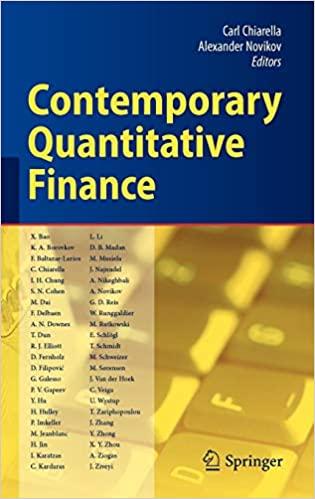Question
Peter La Fleur is the sole proprietor of La Fleur Enterprises. He is exploring the option of going public because his company is growing exponentially.
Peter La Fleur is the sole proprietor of La Fleur Enterprises. He is exploring the option of going public because his company is growing exponentially. The consulting firm that is reviewing his financials has questioned whether La Fleurs CFO is technically competent enough to be the CFO of a publically traded company, as they believe he made several bad financial decisions. The three situations, which the firm brings to Peters attention, are as follows:
a) La Fleur purchased the building in which their corporate office is housed on 1/1/10 for $7,800,000. They put down $2,000,000 cash and had to borrow the remaining amount at 8% over a 20-year term. At the time of the purchase, they had the option to lease the building. The 20-year lease would begin on 1/1/10, and called for payments of $600,000 beginning on that date for the first 10 years and payments of $500,000 beginning on 1/1/20 for the remaining 10 years of the lease. La Fleur had the option to purchase the building for $1 on December 31, 2029 at the end of the lease. Did the CFO make the right decision by purchasing the building? Why or why not? Show your work. For the amortization schedules be sure to print the schedule so all columns fit on one page
b) This year, the company sold land for a non-interest bearing note. The note calls for annual payments of $10,000 for 4 years. The payments will begin one year from the date of the sale. An appropriate rate of interest for this type of note is 6%. The land had an original purchase cost of $25,000. The CFO told the accounting department to record the sale as follows: For the amortization schedules be sure to print the schedule so all columns fit on one page
Notes Receivable $40,000
Land $25,000
Gain on Sale of Land $15,000
Was this entry correct? If not, provide the correct entry.
c) The CFO has a policy of never taking cash discounts on goods purchased, as he believes he can invest the money at a higher rate of the return. The consultants argue that this is not always the case. As an example, they present to Mr. La Fleur the recent purchase of materials of $1,000,000 with terms 1/10, n/30. La Fleur estimates its cost of funds is around 6%. Should La Fleur continue not taking the discounts? Why or why not? Show your work. For the amortization schedules be sure to print the schedule so all columns fit on one page
Step by Step Solution
There are 3 Steps involved in it
Step: 1

Get Instant Access to Expert-Tailored Solutions
See step-by-step solutions with expert insights and AI powered tools for academic success
Step: 2

Step: 3

Ace Your Homework with AI
Get the answers you need in no time with our AI-driven, step-by-step assistance
Get Started


